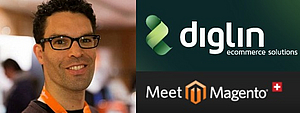Get in touch


Sylvain Rayé, certified French Magento developer and organizer of the Meet Magento CH conference in Zurich, Switzerland, talks in part 1 of our interview about success factors in E-Commerce projects, gives tips, insights and examples for online shops and what is necessary for digital transformation.
About Sylvain Rayé: Sylvain is a computer engineer and certified Magento developer with more than ten years of experience in web development. After his career started as project manager in the French Air Force, he worked for more than six years as CTO at rissip Online Learning.In 2013, Sylvain founded his own company Diglin in Zurich, Switzerland, specialized on bringing physical shops to the online business, based on Open Source products. Sylvain is very much involved in the Magento world. He is a contributor to the Magento community, was vice president of the Magento community Firegento and organizes the Magento Hackathons in Switzerland. Moreover, he is organizer of the Meet Magento CH conference in Zurich, Switzerland.
Salut Sylvain. You are a certified and experienced Magento developer, you have worked as project manager at the French Air Force, later as a CTO at rissip online courses and then founded your own company Diglin in Schlieren near Zurich, Switzerland. Tell us a bit about your journey and about your motivation.
When I started to gain my experience on the Web, I was 17 years old, early involved in the French Air Force to get my first job experience and have the opportunity to study my computer engineer graduate courses in parallel. At this time, I had lots of contacts with US citizens, as in France the Internet was not developed as far as it is today. I really liked the opportunity to talk to people around the world without any borders. Because of the complexity of projects, but also the different needs and aspects to take into consideration while building an online shop, I preferred to invest more and more energy in these kinds of projects. However, buying an online shop was not so obvious until few years ago, so it was difficult to “sell” the idea to merchants to invest in online business and customers were reticent to buy online. I'm glad today that the situation has changed, to have the chance to participate in great online shop projects with enthusiastic people who see the Internet as an additional channel to sell goods.
As an experienced founder, what do you think are the most important things to consider for founders, startups and entrepreneurs when starting a business in the digital industry?
What I learned in the last years is that building a network of contacts is the most important task to do when launching a business. You can have all the motivation, passion or goals in the world; if you don’t have good connections, it’s tough. That’s also why I had to wait before starting my own business when I arrived in Switzerland few years ago.

You founded your company Diglin in 2013, with the mission “to bring physical shops to the online business”. What basics need to be in place for digitization of business models? What are the key success factors for digital transformation?
A fundamental rule to respect is that online businesses have similar basic rules as offline businesses. You have to invest and be present in this channel and not believe that everything will work by itself without having to touch anything. It is actually obvious, but in reality, and most of the time in the case of “traditional” businesses, people completely underestimate this aspect. For example, I very often compare online marketing for B2C to having a shop in a main street or in a mall. If you are in a side street or in a village you have less chance to catch people. In the first case, you will get more potential customers and have a higher ROI but the customer acquisition costs are higher. In online business, that’s the same. Of course, all depends on your domain of activity. You need an online strategy and the right people having the knowledge about it. Today it’s easier to find them.
Regarding the key success factors, you have to capture the imagination and “eyeballs” of the customers. That’s the reason you have to differentiate yourself from the competitionby providing other kinds of services or products but also by investing in the user- and shopping experience – even in B2B.
What is your role in this digital transformation process in projects with your clients? What is the most important aspect of your role in business transformation? Do you have an example?
My role is to accompany my customers in the implementation of their ideas and help them to grow their revenue with a controlled budget. I also give them additional ideas and we work together to reach their goals. I mentioned the user experience: the search function of an online shop or facilitating the checkout are good examples of reducing the frustration of a customer while finding their products and buying online. By improving those two points alone, we helped our customer to raise his revenue by 20 percent.
What recommendations do you have for businesses with regards todigital transformation? What are your best-practice tips for companies for digitizing their business model?
I would recommend having an online and offline strategy. The real term is “Omnichannel”. As an example, there are pure players like digitec.ch, which started with an online presence and today they have physical shops. You can buy online, pick up directly at the shop – which is in fact a warehouse – or the package can be sent for free, it gives customers more possibilities to have a unique shopping experience.
Another tip is to be the first in a niche. For example, the Suisse postal service just announced they want to deliver packages on the week-end – they will be the first company to provide such a service.
You have been involved in some twenty E-Commerce projects and you are experienced in operating E-Commerce solutions and launching online shops. What do you think are the success factors for E-Commerce projects and online shop launches?
From an implementation perspective, choose a good technical partner(s) to work with and have accurate, detailed specifications. Being coached by an external consultancy or contacting the partner references can be a good idea. Unfortunately, a lot of projects fail because this issue is neglected. You may also be inspired by working with companies using Agile methods. The main advantage of Agile methods is that you get deliveries after each work cycle, called sprints. If one day something goes wrong and you are in conflict with your partner, you can continue the project with another partner. That’s also why using Open Source solutions limits the risk to be dependent on a single partner.
What challenges do you see for businesses in E-Commerce?
The main challenge today in E-Commerce is to stay profitable. Customers still expect low pricing of goods in the Internet, on the other hand, some costs have increased: logistics, customer services, payment and marketing.
In part 2 of the interview Sylvain Rayé describes advantages and disadvantages of Open Source and proprietary software, talks about reasons for agile methods in projects and tells us how he became part of the Magento world and the organiser of the Meet Magento CH conference in Zurich.